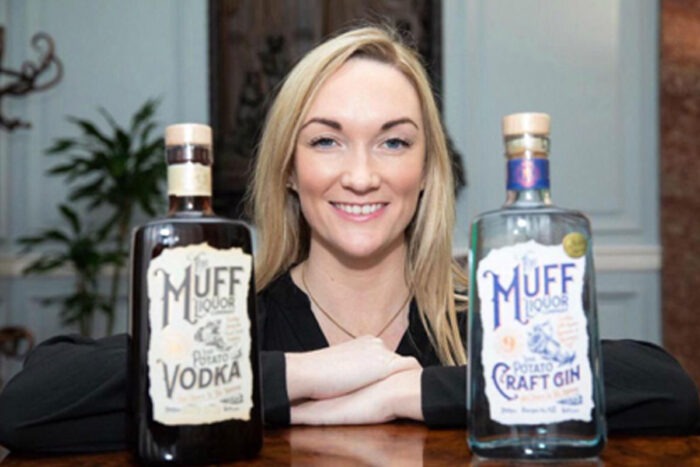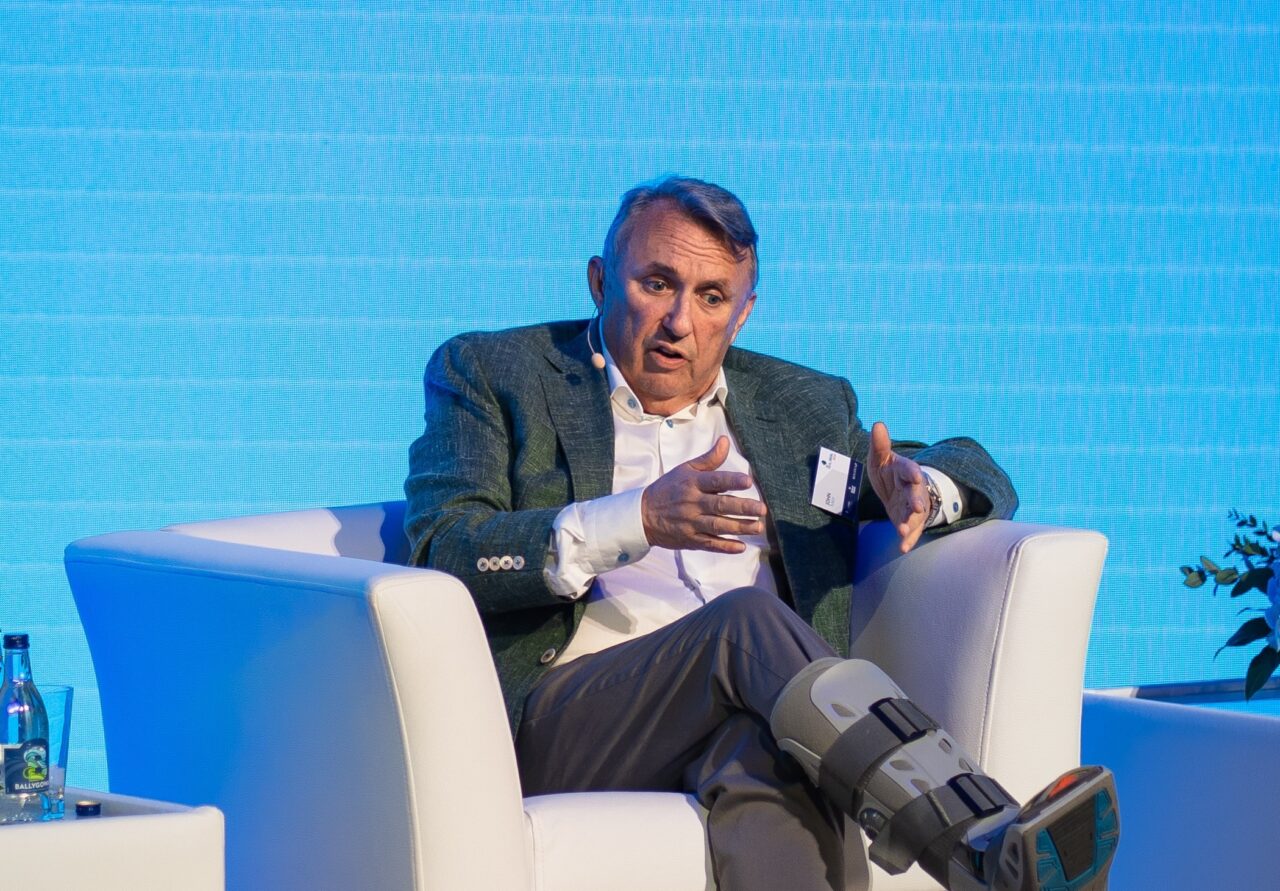John Purdy is hobbling.
His right foot is encased in a protective boot, nursing an injury he picked up while hiking through the hills of south Dublin. The accident was bad enough to require an air ambulance.
But, if the foot is bothering him, Purdy was certainly not letting it show when I caught up with the entrepreneur at the recent Real Deal conference.
At the event, Purdy delivered a tour de force performance as he discussed the various chapters of his career. (“He was a tough bastard, but, boy, he was good,” Purdy told a captivated audience when asked how he would like to be remembered on the day of his funeral).
Having stepped back as chief executive of Ergo, the IT services business he co-founded back in 1993, three years ago, Purdy has had more time to think about the business climate in Ireland, the nature of entrepreneurship, and the turning points in his career.
Plus, as an active investor in a host of emerging tech start-ups, he has a ringside view of the next crop of companies coming through.
As he speaks, it is obvious that he is seriously informed, and that is what made our conversation so informative.
Take his views on banks.
According to Purdy, banks do not really understand the real motivations and fears of business owners and entrepreneurs.
While a bank might advance money, Purdy said it usually demanded strict adherence to a host of rules and covenants, one of which limited the ability of a business owner to take money off the table. For Purdy, that is fundamentally wrong.
“I’m not in the business of stripping the company of cash,” he said. “I am saying to lenders, look, you have to let this thing breathe a bit. There’s somebody at home, who’s saying we’ve been on a journey here. And it’s been a long journey, when are we going to start to enjoy that journey?”
The way Purdy sees it, achieving financial security allows an entrepreneur to take the risks required to drive the business to the next level. If they are worried about their pension or their mortgage, entrepreneurs will play it safe.
Purdy gave the example of Ergo. In 2015, he scored a windfall when he sold a stake in Fenergo, a spin-out of Ergo that has since achieved unicorn status. This allowed Purdy to future-proof his personal finances and sort out crucial things like mortgages and pensions.
But with his personal finances secure, he was in a position to alter the risk profile for Ergo.
Before he took money off the table, Ergo was a €25 million business and had done one small acquisition. Today, it is a €200 million business with 750 people in seven locations globally.
“That monkey was gone. And I remember being at a lecture at Stanford, and the guest lecturer said that you get the business to a certain size, figure a way of getting money off the table, and then go like fuck. Quote, unquote. That’s what happened,” he told me.
This was just one lesson from his business career. Here are five other key takeaways from my interview with John Purdy.
Know when to go
Along with his wife Audrey, Purdy had long made the decision that Ergo was not a family business. The ultimate plan was, and remains, to sell. But, before that sale was to happen, Purdy knew he needed to delink himself from the company.
He did not want earn-outs, and he did not want to be reporting to someone else. “That would not work for me,” he said.
So, he hired a new CEO, the former managing partner of Grant Thornton Paul McCann, with Purdy becoming chair.
Purdy gave McCann parameters for running the company (some 50 per cent of the company’s growth to be organic, while 50 per cent was to come through acquisition), but he committed not to meddle in day-to-day operations.
The strategy has worked. Revenues and earnings are both up, driven, as required, by both organic growth and acquisitions. Indeed, the company recently said it was weighing up taking on equity investment for the first time to expedite growth.
“Paul has brought a new lens. He is doing things that I didn’t do. He’s taken bets that I did not take and so on. He is bringing it to a new level. And, maybe I didn’t have the energy to do that,” Purdy said.
Ignore imposter syndrome
Purdy spoke in glowing terms about Leadership for Growth, an Enterprise Ireland programme designed to help high-potential companies scale their businesses internationally. Purdy completed the programme more than 15 years ago, but the lessons he learned have remained with him.
The programme involved multiple trips to Stanford, the prestigious US university in Silicon Valley.
Purdy had not attended college after he left school. This made him an outlier in the room of 30. Initially, he felt like an imposter.
However, the more he looked around, the more the feeling went away. Unlike most people in the lecture hall, he had bootstrapped his business. Plus, he had achieved something no one else in the room had – he had booked a profit. Everyone else was spending other people’s money, Purdy was making it from himself.
“During those two years, I got a toolkit that I still use today. It sits above me in my office at home. I got a sense that we could be a scaled business, I got that ambition,” he said.
Pivots can be positive
Founders and entrepreneurs often talk about pivots. In many cases, however, they are followed by a restructuring and insolvency.
This was not the case with Purdy. But for a while, it was a close-run thing. His nephew Marc Murphy had built out a financial services software business within Ergo. However, as the world began to grapple with the financial crisis in 2008, the company was losing clients at a dizzying rate.
At one point, his financial controller told him the unit might bring down the wider group.
Purdy and Murpy were faced with a choice – shutter the unit and make people redundant, or pivot the unit into a new area. They chose the latter, moving into the world of financial governance.
The decision paid off, with the unit spinning out to become Fenergo. In 2015, Fenergo raised €75 million from Insight Partners, an investment that facilitated Purdy selling down his stake. By 2021, the business was valued at more than €1 billion.
Sustained success takes time
Purdy has built businesses. He has invested in them. He has sat on their boards. And in his view, the most successful businesses are the ones that are future-proofed. Yes, some companies might achieve phenomenal short-term growth. But Purdy is always looking for a company that can achieve sustained success. And this takes time.
“You’ve got to be prepared for the troughs and peaks of running a business. In some cases, you can have phenomenal success very quickly,” he said. “In my view, that sustainable success only happens over time. And it’s only over time when you can afford to buy the big car or buy the big house or whatever the hell it is.”
Pay it forward
Along with his wife, he remains the majority shareholder of Ergo, and is still the non-executive chair, while he retains a seat on the board of its spin-out FlowForma.
He is the non-executive chair of Johnson Hana, the fast-growing legal services provider, and BeyondBMI, a well-backed weight management platform. He is also on the board of the wealth management platform Dimply. He has other investments.
Purdy said he wants to work with people who have a growth mindset, “who want to scale, want to scale off the island”.
“If the technology is disruptive, that is all the better,” he said. “It kind of has to have a technology element to it. I want to work with people who I enjoy working with.”
But Purdy also wants to give something back. During his career, he said he learned a lot from so many people. Now, he was determined to pay it forward.
“I felt I have gained a huge amount professionally and personally from the time that people have put into me, through Leadership for Growth. Those learnings need to be shared,” he said.
*****

Elsewhere last week, Alice caught up with Laura Bonner, who welcomed celebrity guests and investors to the opening of The Muff Liquor Company’s new distillery in Co Donegal last week. Bonner has big plans, including expansion into the US. Yet, as she told Alice, the company almost went under during the pandemic.
We also launched Mindset Matters, a new podcast series in association with The Wealth Summit. In the first episode, I spoke with Tim Grover and Shari Wenk. Grover is world-renowned for his work with elite athletes and CEOs, while Wenk is a sports agent and entrepreneur. Together, they have written two international best-selling books. In this joint interview, they talk about resilience and high performance.
Introduced in 2021 as a low-cost and non-legal alternative to examinership, Scarp is a mechanism for small insolvent companies with turnover of less than €12 million and fewer than 50 staff to restructure their balance sheets. New data shows what type of companies are availing of Scarp, how they are financing rescue plans, and whether owners retain control after the restructuring process.
We also caught up with the two leadership candidates for the leadership of the Green Party. Speaking to Niall, Roderic O’Gorman talked about his vision for a more social justice-driven party, shedding its urban-centric tag, and how a challenging four years as minister stand him up as the best candidate for the job.
Meanwhile, Thomas spoke with Pippa Hackett about her pitch to bring the party closer to local communities and her track record tackling the paralysis in the forestry industry and contesting elections.


